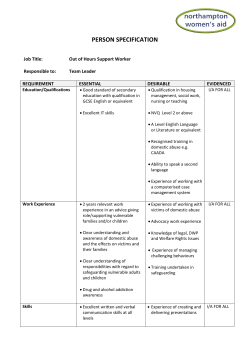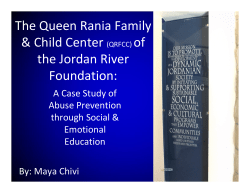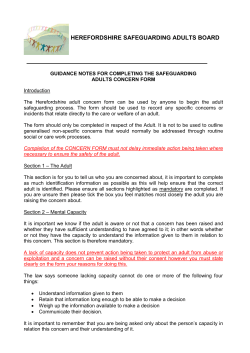
! February 25, 2015 Senator Phil Boyle New York State
! February 25, 2015 Senator Phil Boyle New York State Senate 814 Legislative Office Building Albany, NY 12247 RE: Bill S609-2015 Dear Senator Boyle: CLAAD would like to provide feedback regarding prefiled Bill S609-2015 (“S609”), an act to require baseline and periodic and/or targeted drug testing in prescribing controlled substances. The Center for Lawful Access and Abuse Deterrence (CLAAD) aims to reduce prescription drug abuse while simultaneously optimizing patient care. Since 2009, CLAAD’s National Prescription Drug Abuse Prevention Strategy has encouraged a balanced approach to the prescription drug abuse epidemic. The National Strategy has earned the endorsements of over 30 organizations, including the Drug Free America Foundation, National Family Partnership, American Chronic Pain Association, and NAADAC – the Association for Addiction Professionals. We have made progress in reducing prescription drug abuse, having witnessed the first decline in opioid-related overdose deaths in over a decade.1 There is much more still to do. In light of the fact that the U.S. Centers for Disease Control and Prevention has classified prescription drug abuse as a nationwide epidemic,2 it is critical that policy makers advance measures that increase the quality of patient care and optimize the expenditure of valuable health care resources. S609 rightly prioritizes patient access to comprehensive, accurate urine drug tests (“UDTs”) to prevent, identify, and treat substance use, but it does not go far enough. Mandatory testing should apply across the board to all Schedule II and III controlled substances — immediaterelease, extended-release, brand, and generic — as well as to the other commonly abused controlled substances, such as benzodiazepines and stimulants, as opposed to solely opioid medications. While opioids are often diverted, misused, and abused in the U.S., they are not alone. All controlled substances are classified as such based on their potential for abuse.3 For instance, 23,000 emergency room visits in 2011 were related to stimulant use among people ages 18 to 34,4 and in 2010, of all pharmaceutical-related overdose deaths, benzodiazepines were involved in 29 percent !!!!!!!!!!!!!!!!!!!!!!!!!!!!!!!!!!!!!!!!!!!!!!!!!!!!!!!! 1 Donna Leinwand Leger, Painkiller deaths drop for first time since 1999, USA TODAY (Oct. 15, 2014), http://www.usatoday.com/story/news/nation/2014/10/15/painkiller-deaths-drop-for-the-first-time-since-1999/17262383/. 2 Epidemic: Responding to America’s Prescription Drug Abuse Crisis, OFFICE OF NAT’L DRUG CONTROL POLICY, (2011), http://www.whitehouse.gov/sites/default/files/ondcp/issues-content/prescription-drugs/rx_abuse_plan_0.pdf. 3 21 U.S.C. § 812. 4 The Dawn Report: Emergency Department Visits Involving Nonmedical Use of Central Nervous System Stimulants among Adults Aged 18 to 34 Increased between 2005 and 2011, SUBSTANCE ABUSE AND MENTAL HEALTH ADMINISTRATION (Aug. 8, 2013), http://www.samhsa.gov/data/spotlight/spot103-CNS-stimulants-adults.pdf Center for Lawful Access and Abuse Deterrence 1000 Potomac Street NW, Suite 150-A • Washington, D.C. 20007 • (202) 599-8435 • www.claad.org • @CLAAD_Coalition (6,497).5 CLAAD recommends application of safer prescribing standards to schedules II and III controlled substances, as well as other commonly abused medications, including benzodiazepines like alprazolam. Current quantitative testing technology can provide accurate, specific information on 65 or more substances and their metabolites at a reasonable cost.6 To ensure this more sophisticated type of test is employed and that concentrations of substances are accurately measured prior to the prescribing of powerful medications, CLAAD respectfully submits the attached in-line edits to S609 based on its current form. CLAAD commends your legislation as a balanced, thoughtful, and effective way to identify New Yorkers with substance use disorders for intervention and referral to treatment. If you have any questions or wish to discuss our comments on S609 further, please contact CLAAD at (202) 599-8435 or ksimon@claad.org. Sincerely, Kyle Simon Director of Policy and Advocacy Enclosure: S609-2015 with CLAAD recommendations !!!!!!!!!!!!!!!!!!!!!!!!!!!!!!!!!!!!!!!!!!!!!!!!!!!!!!!! 5 “Opioids drive continued increase in drug overdose deaths,” Centers for Disease Control (Feb. 20, 2013), http://www.cdc.gov/media/releases/2013/p0220_drug_overdose_deaths.html. 6 Drug Testing: A White Paper of the American Society of Addiction Medicine (ASAM), AMERICAN SOCIETY OF ADDICTION MEDICINE, (Oct. 26, 2013), http://www.asam.org/docs/default-source/publicy-policy-statements/drug-testing-a-white-paper-byasam.pdf. 2
© Copyright 2025





















